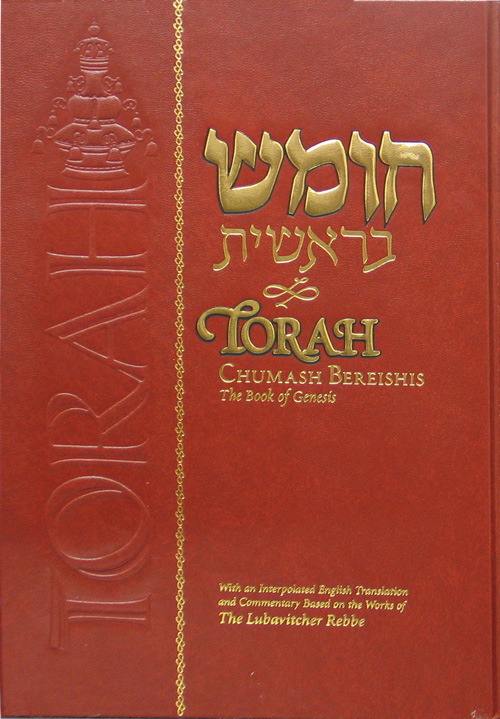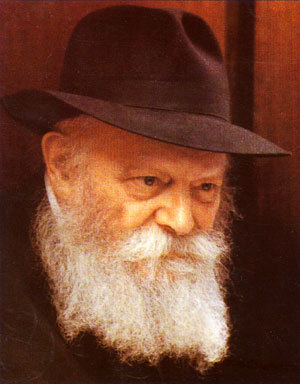The Kosher Bookworm — “Chumash Bereishis: The Book of Genesis”
A commentary based upon the works of Rabbi Menachem M. Schneerson, zt”l
Issue of Dec. 5, 2008 / 8 Kislev 5769
The literary history of the Jewish people is studded with translations and commentaries on the Bible and other sacred writings. Each makes it own claim to accuracy and the truth. To each we cherish the sincerity of its author and try to learn the lessons being taught and gain from the religious experiences being drawn from the authors’ intent.
The volume under review this week is unique in that it is a compilation of the works of an individual who has had a special relationship with our people that continues to this day, over a decade since his passing. This commentary was culled from a multitude of works penned by Rabbi Menachem Schneerson, the previous Rebbe of Lubavitch –– Chabad.
This work is part of a larger effort by the Chabad movement to bring a lucid, fluent and informed English language version of Rabbi Schneerson’s writings on the Chumash together with insights from other traditional Jewish commentators drawn from through the ages. Within these pages there is no attempt at ideological conformity.
What is so special about this work are the introductions given before each parsha. Written by the editors, each essay is a work of intellectual force that points to almost every facet of the upcoming text from a historical, theological and sociological perspective. The English used is correct by every standard and of this, I am personally proud.
The ongoing commentary that flows with the text is comprehensive and talks to the reader, not at the reader. You are treated to an ongoing shiur without the technical challenges of distracting abbreviations, sophisticated vocabulary and unnecessary yinglish jargon. What you are reading is clear to both the mind and to the heart. That is the true presentation of Chassidus to which the reader is entitled.
Given the events of this past week, I am not unmindful as to the role Chabad played on the world stage. Their victimization is of historic import and the husband and wife team who were martyred in Mumbai, India will forever be remembered in our hearts for their bravery and fortitude on behalf of our harassed people.
Rabbi Gavriel and Rivka Holtzberg, shluchim of Chabad, entered the stage of Jewish history last week and were sacrificed, al Kiddush Hashem. They both died as they lived, in service to their faith, on behalf of their people’s spiritual well-being.
This past week’s Torah reading was from the parsha of Toldos dealing with the life and legacy of our matriarch Rivka. This is the only parsha where she plays so dominant a role in our people’s formative years. This irony of names was what prompted me to choose this particular volume for review this very week.
In studying the text and commentary, I was cognizant of Rivka Holtzberg’s life mission of kiruv and of her Chabad passion to reach out to our brethren, worldwide.
Accordingly, I was most taken by the following references in the commentary concerning the role that Rivka of antiquity played in kiruv.
Upon observing how Rivka takes Eisav’s clothes and puts them on Jacob, the commentary states the following:
“Rebecca wanted to ensure that Isaac’s blessings would rest upon her descendants, the Jewish people, no matter to what degree they would remain openly loyal to the teachings and practices of the Torah. By having Jacob receive Isaac’s blessings dressed as Esau, Rebecca ensured that the blessings would rest even on those Jews who would drift away from their Jewish roots and would no longer be recognizable as Jacob’s children. We learn from Rebecca that even those Jews disguised as ‘Esau’ are deserving of blessing since, beneath their external garb, they too are truly ‘Jacob’ [page 177].”
This commentary to Rivka Emainu’s action served as the life mission for Rivka Holtzberg and her husband, Rabbi Gavriel. I felt that it was no coincidence that this tragedy occurred on the cusp of Shabbos Toldos.
There is a lesson to be learned by all of us, a lesson that the life force of kiruv rechokim is a mandate that requires our daily sacrifice. To spiritually ignore our fellow Jew in inexcusable. This past week’s parsha clearly teaches us that, and the martyrdom of Rivka, our Rivka, clearly reinforces that message to us.
This sacred commentary, published initially for use at English-speaking Chabad Houses, deserves a special place in every Jewish home, and in every shul library in our community.
As we learn from it, and from each successive volume in this series, let us fervently remember the lesson learned from above and honor, forever, the sacred memory of Rivka and Rabbi Gavriel Holtzberg, Hashem yinkom damam.
This chumash is only available from the the publisher, the Kehot Publication Society at www.kehot.com or (718) 778-0226.

 59.0°,
Mostly Cloudy
59.0°,
Mostly Cloudy 











